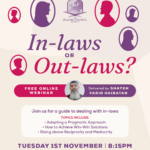Every marriage experiences ups and downs. These may arrive in the form of moments of joy or moments of frustration. The moments can yield long periods of love and care for one another or periods of inattentiveness and maybe even neglect. The mistake many couples make is assuming that a successful marriage is one that will replicate the happiness and love experienced in the early periods of marital life. This “honeymoon period” may last a few weeks, months or possibly even years. However, expecting this honeymoon period to last a lifetime is unrealistic of a marriage and unfair towards the relationship. This is not because marriages are destined to be unfulfilling, or because happiness is not something sustainable within a relationship. Instead, it is because a marriage is built on shared experiences of everyday life.
An important realisation needs to take place that recognises the usefulness of lessons that can be learnt from the ups and downs of marriage. These experiences can make the couple more aware of each other’s personalities, provide opportunities for self-reflection, develop future parenting skills and build conflict resolution strategies. The commitment to longevity in a relationship will facilitate all these positives and allow couples to feel more fulfilled. However, seeking a swift resolution through divorce at the first sign of difficulty could teach the couple a different and very dangerous lesson altogether. Within the subconscious, individuals may seek to naturally detach themselves from situations they find difficult or challenging. The marriage provides multiple opportunities to embrace and overcome hardships and therefore, acts an agent for building character.
The character building is most productive when couples treat each other as partners and not adversaries. Instead of blaming one another for their own failings, partners should help each other to develop and become better individuals, spouses and Muslims. Instead of opting for the fast-tracking of a divorce, a sincere desire and effort should be made to reconcile. The purpose of this article is to provide three practical tips for resolving and reconciling differences before the marriage is deemed irreconcilable. These tips can be the keys to unlock the potentially stubborn door to reconciliation.
1. Communicate – don’t just speak
The number one reason for marital breakdown we find amongst couples at the Council is their lack of communication with each other. Communication is not only the ability to speak or express one’s thoughts; but it is also the ability to listen and understand what the other person is saying, responding constructively, empathising with each other’s reactions and being able to adapt to one another’s behaviour. In order to effectively influence and interact with your spouse, you must be able to demonstrate that you understand their perspective. This requires you to train yourself to listen respectfully and attentively. A failure in this basic form of communication will not only make the marriage suffer, but also your relationship with those outside of your marriage such as family, friends and even work colleagues.
The Prophet (ﷺ) was the most eloquent communicator – both in terms of listening and understanding, as well as preaching and delivering. Once He (ﷺ) said to ‘Āishah: “I know when you are pleased with me or angry with me.” She said: “How do you know that?” He (ﷺ) said: “When you are pleased with me, you say, ‘No, by the Lord of Muḥammad,’ but when you are angry with me, then you say, ‘No, by the Lord of Ibrāhīm.’” ‘Āishah said: “Yes (you are right), but by Allah, O Allah’s Messenger (ﷺ), I leave nothing but your name.”[1]
Look at how the Prophet (ﷺ) was able to detect when his wife would be angry with him, through his ability to listen. The way the Prophet (ﷺ) listened and observed his wife’s reaction, behaviour and choice of words when she would be happy or upset with him; gave him the opportunity to be more empathetic. The attentiveness displayed made it possible for the Prophet (ﷺ) to empathise with her and showed her that he is truly listening to her grievances, despite her being unaware that this was even being communicated.
Once a couple came to the Council seeking marital counselling in order to settle some of their differences. The husband stated that he could not understand his wife because she would not listen. I sought a clarification from him and he repeated the same thing; this time with examples to justify his statement. So I replied: “Are you saying that you don’t understand your wife because she won’t listen to you? Shouldn’t it be that you listen to her in order for you to understand?”
The above case is not restricted to that particular couple, but so many couples who are facing the same problem. The inability and unwillingness to communicate properly is impeded by a failure to listen to one another properly. When couples don’t take or give time to listen to each other, they tend to spend or waste much more time in correcting and mending any misunderstandings down the line. They tend to undo, redo, solve or resolve unheard and unresolved problems and emotions when their marriage suffers from major cracks. All of this could be avoided if they were to listen and seek to understand each other before speaking.
2. Unite and win together – don’t just think and act as an individual
It is unfortunate that the society in which we are living in is a self-centric society rather than a community/family-centric one. This is apparent in the way we see individuals behaving and acting as members of a society. Whether it be as an employee in the workplace or a spouse/parent/sibling in an extended or nuclear family unit; we find that the focus tends to be on individual rather than collective gains. For example, spouses will often act as competitors or adversaries in the relationship instead of supporting and cooperating with each other to work towards making the family unit stronger, more efficient and productive. The husband feels that he is the head of the house and that everyone should adhere to his words. He sees himself as the ultimate authority which deserves unrelenting support and obedience. If he does not receive this support and obedience, it gives him the power to humiliate or even abuse his wife. The wife feels that she is entitled to the highest living standard the husband must provide, even if that is difficult or unattainable. She acts, behaves and demands in a way that is unrealistic with the husband’s income or purchasing power; and refuses to show any appreciation or satisfaction, lest he should cease buying and providing for her to avoid the ungrateful reactions.
Having such a selfish, or “Win/Lose” attitude in a relationship, and working against one another, rather than working together for the happiness and betterment of one another is undoubtedly a flawed approach. It will not take long before such a relationship develops cracks in its walls because the foundational thought process and attitude is not grounded on solid principles. Oftentimes the excuse is given that “I am an independent person and that I do not need them to be happy or make the marriage workable”. What they fail to realise is that once a person gets married, they (should) give up their perception of an individualistic, ‘independent’ and self-centric person. This is not to say that they must be dependant on the other spouse, and burden them with more of the responsibilities to make a marriage work. Rather, it means that they need to work in a constructive, positive and complimentary way that synchronizes the relationship. This will help create interdependence, which is much more nourishing for the marriage than working against each other.
When couples are interdependent, they have removed the I from their vocabulary and replaced it with we – “we should be happy”, “we need to work together towards reconciliation”, “we need to be successful as a couple and parents”. This mature way of thinking was instilled by the Prophet (ﷺ) when he said: “A believer towards another believer is like the bricks of a wall, enforcing each other.” While saying that, the Prophet (ﷺ) clasped his hands, by interlacing his fingers.[1] If this is the mindset we must all have towards other Muslims and towards the Ummah; then it does not make sense to not have the same mindset towards our spouse, since they are our twin halves. The Prophet (ﷺ) said: “Woman are the twin halves of men.”[2]
When couples are more concerned about themselves as individuals than they are about themselves as a couple, they will most likely become more insensitive and inconsiderate towards one another. They will start to neglect the little kindness, courtesies and appreciation that is required to sustain any reconciliatory efforts. They will focus on their own needs, justifying them from the Sharī‘ah’s perspective while looking for evidence to show the wrongness of the other person. This, coupled with the lack of communication, will make any reconciliation efforts useless, fruitless and meaningless. So many times at the Council, we find that one or both of the spouses will leave their marriages, abandon their children and relinquish their spousal and parental responsibilities – all in the name and disguise of being “liberated”, “free”, and “independent”. They fail to realise and see that if they were to act more interdependently they will be able to achieve and accomplish a far greater happiness and standard of living than if they were to be self-reliant, independent and self-sufficient.
No sooner do they make such a fateful decision in ending their marriage without giving reconciliation its due effort, couples start to feel a sense of emptiness and sadness within themselves. We find them coming back to the Council to see how they can get back together and making their marriage work for their nth time. They start to realise that they were acting from an adversarial, defeat the opponent, selfish perspective. They (wrongly) assumed this will make them attain victory in their pursuit of happiness. However, true success and victory comes when it brings mutual benefit and happiness to everyone involved (including the children), and Allah is pleased with their efforts of wanting good for the other and abstaining from anything that causes them harm. The Prophet (ﷺ) said: “Whoever relieves the hardship of a believer in this world, Allah will relieve his hardship on the Day of Resurrection. Whoever helps ease one in difficulty, Allah will make it easy for him in this world and in the Hereafter. Whoever conceals the faults of a Muslim, Allah will conceal his faults in this world and in the Hereafter. Allah helps the servant as long as he helps his brother.”[3]
The Prophet (ﷺ) instructed his wife ‘Āishah: “O ‘Āishah! Allah is gentle and He loves gentleness. He rewards for gentleness what is not granted for harshness and He does not reward anything else like it.”[4]
Couples seeking to work together to create a situation where they can both “win” and want good for each other, will be rewarded by Allah with happiness in this world and ever-lasting happiness and bliss in the hereafter. Allah says in the Qur’an: “Allah has promised to the believers -men and women, – Gardens under which rivers flow to dwell therein forever, and beautiful mansions in Gardens of ‘Adn. But the greatest bliss is the Good Pleasure of Allah. That is the supreme success.”[5]
3. Show Iḥsān (act in a favourable manner) – don’t debase your conduct and character
Husband and wife have to take on certain roles and responsibilities in order for the reconciliation effort to have its desired outcome. The problem arises when at least one of them does not live up to what is expected of them in the form of iḥsān. They fail to give it their best and even refuse to invest their time, energy, gentleness and good akhlāq (character) in this crucial juncture of their marital life. These are key ingredients of iḥsān that are easily ignored. In addition, each spouse can feel that Qur’anic and Sunnah justifications can be used to get what they want and deserve from their spouse; without understanding their own limitations and how those limitations might prevent them from achieving the desired outcome.
They do not realise that by not having iḥsān couples are setting themselves up for future despair and trouble. They fail to understand that iḥsān is a concept that if it is not perfected with their significant other, then it will be difficult to apply it with others; including if they were to remarry to someone else. Furthermore, reconciliation should be looked at as being given an opportunity by Allah to do good and be excellent towards one another. After all, it was Allah who was amazingly Excellent towards them that He had placed in their hearts love and mercy for each other in order to get married. Allah says in the Quran: “And do good as Allah has done good to you. And desire not corruption in the land. Indeed, Allah does not like corrupters.”[6]
The beautiful aspect of having iḥsān is that one is embodying one of the attributes of Allah – that of excellence and doing good to others – because that will bring about His iḥsān upon us. The Prophet (ﷺ) said: “Verily, Allah is excellent (muḥsin) and he loves excellence (iḥsān).”[7] What if Allah was to deal with us the way we deal with Him and His commands? What if what we send to Allah of our (bad) deeds, He was to (justifiably) send back his wrath according to our deeds? Allah says in the Qur’an: “And do not throw (yourselves) with your (own) hands into destruction. And do iḥsān; indeed, Allah loves the doers of good (muḥsin).”[8] In the context of reconciliation it can be said that Allah is advising couples to commit to iḥsān in order they do not throw themselves into destruction, such as having a broken family, living with the humiliation of having failed marriage and the darkness of uncertainty that awaits them. Allah says in the Qur’an: “For them who have iḥsān is the best [reward] and extra. No darkness will cover their faces, nor humiliation. Those are companions of Paradise; they will abide therein eternally.”[9]
Just to give a brief example of how powerful iḥsān can be; a wife once applied to the Council for a Khula’ stating that she has exhausted all of her efforts in making the marriage work but the husband did not show any willingness or effort on his part to contributing to the marriage. When the husband received our request for a joint meeting to get his side of the story and for us to determine the next course of action, he was shaken up by the wife’s application to dissolve the marriage. He came to the meeting well-prepared and ready, but not as how one would imagine a defence attorney coming in with arguments and justification, but as one who was ever-ready to be a doer of good, humility and gentleness. He appreciated the wake-up call that he received and the new-found appreciation he has for his wife and the family. He was sincerely remorseful for his past behaviour and neglect and had a concrete plan for making the marriage work. He communicated all of this in such a way that his wife was convinced of his iḥsān-ic approach moving forward. In other words, his iḥsān was communicated far more eloquently than the words he used or the action he was yet to take. He was rewarded with having been given another chance in this world, and it is hoped that Allah will reward him in the hereafter: “For them who have iḥsān is the best [reward] and extra. No darkness will cover their faces, nor humiliation. Those are companions of Paradise; they will abide therein eternally.”[10]
Conclusion
In conclusion it is important to note that regardless of what any marriage counsellor, Imām or religious authority says or recommends to the couple; ultimately change can only occur if it is desired by both parties. Couples cannot be persuaded to change because it is good for them and the family unit if they fail to see that good themselves. The gate of change cannot be opened through argument or emotional appeal; it can only be opened from the inside, as only the individual has the keys and will power to open the gate. This is the meaning of what Allah says in the Qur’an: “Indeed, Allah will not change the condition of a people until they change what is in themselves.”[11] Hence, when one or both of the couple say that they cannot or will not reconcile; they are weakening their ability, resolve and power to sustain and maintain a happy marriage. This can all be achieved if the proper channels of communication, lack of selfishness and iḥsān are employed.
[1] Ṣaḥīḥ al-Bukhārī, Ḥadīth 481
[2] Sunan Abū Dāwud, Ḥadīth 204, Sunan al-Tirmidhī, Ḥadīth 105
[3] Ṣaḥīḥ Muslim, Ḥadīth 2699
[4] Ṣaḥīḥ Muslim, Ḥadīth 2593
[5] Sūrah al-Tawbah, 9:72
[6] Sūrah al-Qaṣaṣ, 28:77
[7] Al-Ṭabarānī, Muʿjam al-Awsaṭ, Ḥadīth, 5884
[8] Sūrah al-Baqarah, 2:195
[9] Sūrah Yūnus, 10:26
[10] Sūrah Yūnus, 10:26
[11] Sūrah al-Raʿd, 13:11













